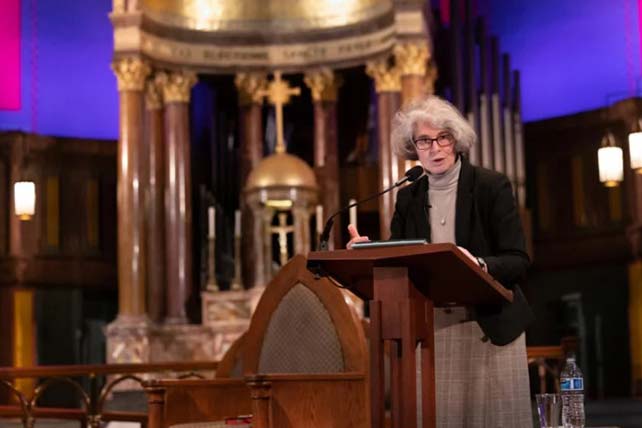Those Catholics, the bishops’ report said, are most pained by the ongoing sexual abuse crisis, the fraying of communities after the pandemic and polarization in the church laity and among bishops. They listed among their top concerns the ongoing marginalization of immigrants, the poor, ethnic minorities, the homeless, incarcerated people, people with disabilities and mental issues, people suffering addiction, the LGBTQ+ community, the unborn and their mothers and women, including parish staff who feel unseen and underpaid.
Among the young people at Becquart’s talk, a resumption, post-pandemic, of Fordham University’s annual Russo Lecture series, the greatest concern seemed to be the lack of Catholics their own age who are listening in or to the church at all.
RELATED: The Nun Who Became a Star Shares Her Wisdom in New Book of Letters
“Hearing this talk has given me more of a sense of urgency to make sure we’re sharing with our community members, the young adults, so they can share with their friends,” said Kayleen Hecksher, a member of the leadership team of Apostolist, a ministry at St. Paul’s for young adults in their 20s and 30s. The church, the seat of the priestly order known as the Paulist Fathers, also has a well-known ministry for LGBTQ+ Catholics called Out at St. Paul’s.
Hecksher wanted her fellow young Catholics to know that “there is space for conversations that no one was expecting there to be space for.”
But Analucia Castillo-Cano, another member of Apostolist, said she keeps hearing church leaders say, as Becquart did, that “youth are not the future of the church; they are the present.”
“It’s reassuring to hear that, but again, we need more strategies as to actually how to bring (the youth) in,” said Castillo-Cano, who travels from Queens into Manhattan every week for a special 5 p.m. Mass with a choir led by young adults. “Because we are here, but I have friends that don’t come to church. … They wouldn’t know. So how do we make sure that we get them?”
Hecksher added, “We need to regain the participation of people that have felt pushed out.”
This article originally appeared here.

